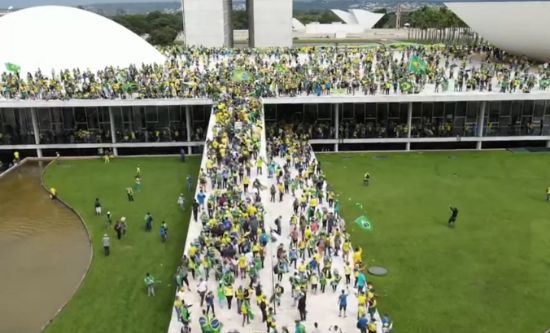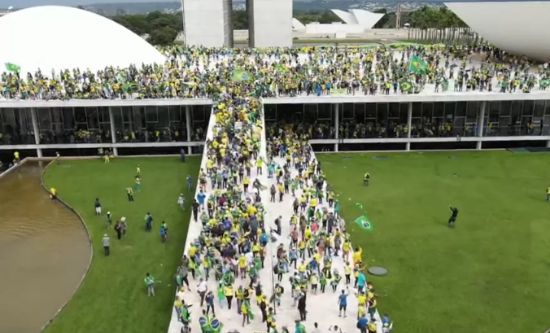
On Sunday 8 January a mob of Bolsonaro fanatics rampaged through the Presidential Palace, vandalising the empty Congress and Supreme Court buildings of Brasilia, demanding the removal of the country’s president Lula, newly installed on 1 January. In this imitation of Donald Trump’s supporters’ rampage into the then working US Congress on 6 January 2021, we again see in Brazil the violent forces of open political reaction.
As President, Jair Bolsonaro called for the closure of Congress and the Supreme Court. He militarised his cabinet. From before his own election, he constantly attacked the country’s voting system. He promoted a strong military role in Brazil’s politics. In August 2021 he promised to reject decisions by one of the Supreme Court justices.
During Bolsonaro’s four years as president, poverty and inequality spiked, public services suffered, and environmental destruction exploded. The shameful handling of the Covid-19 pandemic resulted in 700,000 deaths. Corruption in areas like vaccine purchases was widely publicised. In the second half of 2021, GDP shrank. Yet an intense reactionary campaign fomented more votes for Bolsonaro.
Lula’s disadvantageous position in the country’s elected chambers reflects the success of Bolsonaro’s cynical and gangster like programme. Bolsonaro’s right-wing party, the Liberal Party, has 99 deputies, more than any other. Thirteen of the 27 elected governors gave their support to Bolsonaro; only ten supported Lula. Bolsonaro won about 51 million votes in the first round and 58.2 million in the second round. In every single state, support for Bolsonaro grew more than for Lula. Yet Lula gained immediate recognition from the imperialist states following his victory, obstructing the Bolsonarists’ attempts to overturn the result.
The 8 January assault on the capital’s government buildings was anticipated on 12 December. Then Bolsonarists attempted to storm the HQ of the Federal Police in Brasilia, burning cars and buses, and vandalising shops and petrol stations, demanding a victory for their leader, while hundreds of road blocks were set up across the country by truck drivers, removed only when Bolsonaro conceded transition, but not recognition, of the election result. This ‘rehearsal’ was followed by encampments outside the Brazilian Army’s HQs in Brasilia and other cities, which for two months openly demanded military intervention against Lula.
Bolsonaro refused to attend the 1 January inauguration, leaving the country the day before. Lula thus accepted the presidential sash from ‘the Brazilian people,’ represented by Aline Sousa, a 33-year-old black woman waste collector.
On 4 January Brazil’s electoral court rejected Bolsonaro’s petition to annul the election ballots, calling the outgoing President’s allegation that some voting machines had malfunctioned ‘ludicrous and illicit’ and ‘ostensibly conspiratorial with respect to the democratic rule of law.’
In Brasilia about 5,000 Bolsonarists then gathered outside the military barracks, counting on the sympathy of the troops inside. After all, thousands of serving and retired officers will now be removed from the federal administration, where they had highly paid jobs and very favourable pensions. The assault on Congress began with a march coordinated by shadowy Bolsonarists who, planning two weeks in advance, paid for some 100 buses to take whatever demonstrators they could attract, to join the campers. Together they then prompted the demonstration of up to 10,000 to the Planalto complex. Here, they broke through security barriers, and unimpeded for two hours, plundered the interiors of the buildings, and defaced the exteriors, as truckers again blocked roads across the country.
Once the news of this assault was received by President Lula (then in São Paulo state overseeing flood relief), the Federal Police were ordered in. They cleared the buildings in less than half an hour. Sheltering in hospital in Florida, Bolsonaro distanced himself from his supporters’ actions by tweet, but did not demand they cease. Subsequently, on 11 January he provocatively shared an absurd video on social media that said: ‘Lula was not elected by the people, [but] chosen and elected by the STF [Supreme Court] and TSE [Superior Electoral Court].’
About 209 individuals were arrested on site and another 1,200 the next day at the encampment, so 1,409 in total, of whom 740 are held in custody, with more than 300 released on tag, their passports and gun licences removed, forbidden to leave their cities or use social networks. The armed forces were ordered to dismantle all Bolsonaro supporters’ camps, and all roadblocks were cleared across the country within 24 hours. The governor of Brasilia, Ibaneis Rocha, an ally of Bolsonaro, was removed from office for 90 days over his failure to secure the buildings. Justice Minister Flávio Dinon warned that those who participated in or financed the destruction would be prosecuted. Brazilian Attorney General Augusto Aras agreed to a request to investigate Bolsonaro for the crime of incitement.
The draft decree
Anderson Torres, the Federal District’s police chief (Bolsonaro’s former Justice Minister), was relieved of his duties for connivance with the demonstrators. Torres had fired subordinates and left the country before the riot. A draft of a decree that would have allowed Bolsonaro to establish a ‘Defence State’ at the Electoral Tribunal’s headquarters was found in Torres’ home. It ordered the military to take over the TSE and set up a 15-member commission, eight of whom would be nominated by the Minister of Defence to undertake a ‘verification of the compliance and legality of the electoral process’. He was arrested in Brasilia on 14 January, returning from Florida, after the Justice Minister’s threatened to start extradition procedures against him.
Lula returned to the Planalto on 9 January. He stated ‘We have Army intelligence, Air Force intelligence, ABIN [Brazilian Intelligence Agency]; none of them warned me.’ He sacked 53 military officers guarding the presidential residence or working in the National Security Advisor’s office, as complicit in the disorder. Large demonstrations took place the same day in cities, including São Paulo, Recife and Rio de Janeiro, supporting Lula and democracy, chanting ‘No amnesty!’ for the plotters and attackers. Valdemar Costa Neto, the head of the Liberal Party, was forced to condemn the vandalism.
On 16 January, the president sacked the entire management of the Brazilian state-run media (EBC) over its ambiguous coverage of the riots in Brasilia and the broadcast of provocative statements from Senator Flávio Bolsonaro, son of the former president.
On 19 January the TSE announced an investigation against former President Jair Bolsonaro for his abuse of power during the 2022 elections. At least 16 cases against Bolsonaro are already before the Court. Deputy Attorney General Lucas Rochas asked the Court of Accounts to block Bolsonaro’s assets to compensate for the damage caused by his followers. On the 20 January Lula met the senior military commanders to remind them of their services’ legal responsibilities towards the elected government. In any case, the new government will name new heads for the three branches of the military.
The economy
Brazil had the world’s 12th largest GDP in 2021, but the GDP per capita was US$8,857 per inhabitant, lower than the global average of $11,000. Yet it has the world’s 7th largest number of billionaires. At the moment official unemployment is 9.8% and inflation 9.4%. The public-debt-to-GDP ratio is some 15 percentage points higher than the average of 2002–2010; the budget shortfall is far larger. So, its sovereign credit ratings are weaker, and borrowing more expensive. Lula has less room for budget manoeuvres, and markets will react harshly against steps endangering profits. Lula will announce a new set of fiscal rules later this year, which have to accommodate the social spending Bolsonaro forced through worth 41.25 billion reais, trying to bribe voters before the election. Brazil’s economic growth is expected to be weak this year, and public debt is bound to be raised to meet social demands, but Lula faces a strong legislative opposition.
Brazil has a social crisis, in employment, health, housing and education. The number of Brazilians who do not get enough to eat has risen from 6%, just before Bolsonaro took office in 2019, to 16%. The consequent desperation and crime – with about 50,000 murders in 2021 – strengthens the surge in pro-autocratic, neo-fascist politics. The challenge is enormous. Almost immediately after Lula’s inauguration he announced that the 2013 ‘More Doctors’ programme, closed during Bolsonaro’s administration, will be resumed. In this programme, in the five years before being expelled by Bolsonaro in 2019, nearly 20,000 Cuban medics treated 113,359,000 patients in some 3,600 municipalities.
On 18 January Lula, after meeting with trades unionists, stressed that the country’s minimum wage must rise in line with its economic growth, after the government approved a 7.43% year-on-year increase in monthly wages to 1,302 reais ($253.59).
Europe moves in fast
The day after the 8 January riot, US President Biden issued a statement fully supporting ‘Brazil’s democracy and for the free will of the Brazilian people as expressed in Brazil’s recent presidential election’. Lula is invited to Washington on 10 February. In response German Chancellor Olaf Scholz arranged to arrive in Brasilia faster, on 30 January, with members of the German cabinet and executives representing large German companies. He will also visit adjacent countries to promote the interests of European capital. Lula knows that Brazil requires massive investment and new markets. To balance European ambitions, Lula plans a trip to China in March. He has returned Brazil to the Community of Latin American and Caribbean States (CELAC), abandoned by Bolsonaro in 2019, and announced his attendance at its VII Summit of Heads of State and Government, held on 24 January in Buenos Aires. Lula also promptly declared support for a two-state solution to the Palestinian crisis, and expelled the current Israeli ambassador on 12 January.
The forest crisis
On 2 January Lula reinstated the $1.2bn Amazon Fund Initiative with Norway and Germany. By 19 January, the environmental agency Ibama made its first raids against illegal deforestation in indigenous reserves. He signed orders to rebuild the country’s environmental institutions and reintroduce fines for environmental crimes, abolished by Bolsonaro. An alliance with Indonesia and Congo for forest funding was announced. He initiated a Ministry of Indigenous People led by Sonia Guajajara, the first ever indigenous woman to head a ministry. Thirteen new indigenous territories will be demarcated by 31 January. Lula pledged to end Bolsonaro’s murderous destruction of forests, a 60% increase from the prior four years, with the consequent severe malnutrition and sickness of the indigenous peoples. Lula will face resistance from Congress, where Brazil’s farmers account for more than one-third of the Lower House and Senate, and have twisted the tax system to their great favour eg the Cotton Culture Support Fund, which provides subsidies to promote the expansion of cotton in Mato Grosso. From 2001 to 2021 Mato Grosso lost 12.6Mha of tree cover, equivalent to a 22% decrease in tree cover since 2000, and 6.43Gt of CO₂ emissions, as farmers simply trashed the trees in the state. Cotton represents Brazil’s seventh-largest export product in terms of value. From 1996 to 2017, farm tax exemptions resulted in $10.8bn of uncollected State Goods and Services Tax nationally. It is the economic strength of the farm sector that is the key material force for reaction in the country. The appropriation of these farms with workers’ control, should be central to communist demands.
Alvaro Michaels




